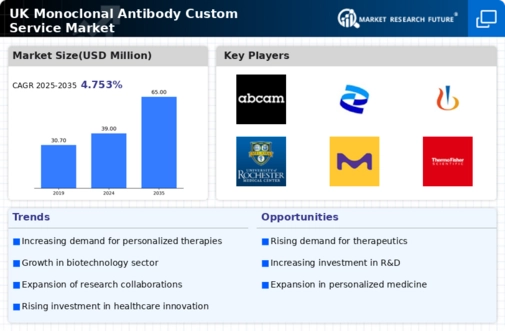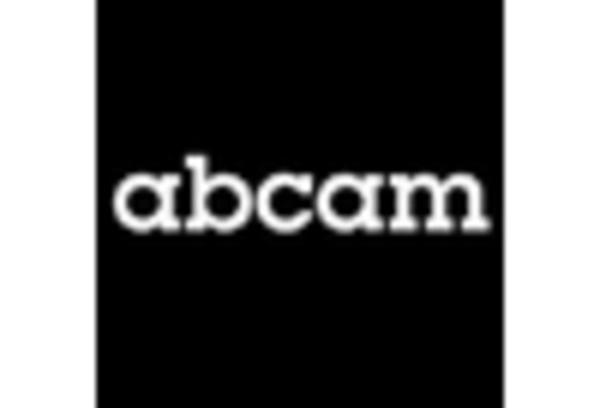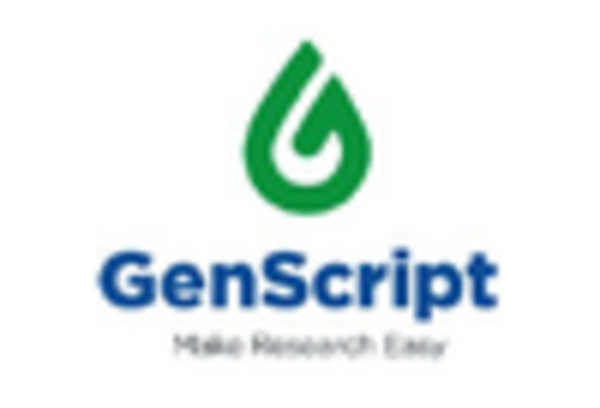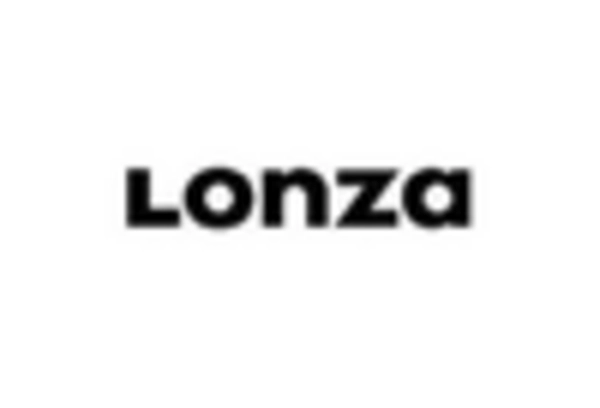Advancements in Genomic Technologies
The monoclonal antibody-custom-service market is benefiting from advancements in genomic technologies, which are revolutionizing the way therapies are developed. Techniques such as CRISPR and next-generation sequencing are enabling researchers to identify novel targets for monoclonal antibodies more efficiently. This technological progress is likely to enhance the capabilities of custom service providers, allowing them to create more precise and effective antibodies tailored to specific diseases. As the understanding of genetic factors in disease continues to evolve, the demand for monoclonal antibodies is expected to rise, thereby propelling growth in the monoclonal antibody-custom-service market. The integration of genomic data into the development process may also lead to more successful therapeutic outcomes.
Rising Prevalence of Chronic Diseases
The monoclonal antibody-custom-service market is influenced by the rising prevalence of chronic diseases in the UK. Conditions such as cancer, diabetes, and autoimmune disorders are becoming more common, necessitating the development of targeted therapies. According to recent health statistics, chronic diseases account for approximately 70% of all deaths in the UK, highlighting the urgent need for effective treatment options. This growing patient population is likely to drive demand for monoclonal antibodies, which are increasingly being used in personalized medicine approaches. Consequently, the monoclonal antibody-custom-service market is expected to expand as healthcare providers seek customized solutions to address the specific needs of patients suffering from these chronic conditions.
Growing Focus on Research Collaborations
The monoclonal antibody-custom-service market is witnessing a growing focus on research collaborations among academic institutions, biotech firms, and pharmaceutical companies in the UK. These partnerships are essential for advancing the development of innovative monoclonal antibody therapies. Collaborative efforts often lead to shared resources, expertise, and funding, which can accelerate the research and development process. In 2025, it is anticipated that collaborative research initiatives will account for a substantial portion of the funding directed towards monoclonal antibody projects. This trend is likely to enhance the capabilities of custom service providers, as they work closely with partners to develop tailored solutions that meet the specific needs of various therapeutic areas, ultimately driving growth in the monoclonal antibody-custom-service market.
Regulatory Support for Biotech Innovations
The regulatory landscape in the UK is becoming increasingly supportive of innovations in the monoclonal antibody-custom-service market. Regulatory bodies are streamlining approval processes for new therapies, which encourages companies to invest in custom services for monoclonal antibodies. The Medicines and Healthcare products Regulatory Agency (MHRA) has introduced initiatives aimed at expediting the review of biopharmaceuticals, which could potentially reduce time-to-market for new treatments. This supportive environment is likely to foster growth in the monoclonal antibody-custom-service market, as companies seek to navigate regulatory challenges more efficiently and bring their products to patients faster. The anticipated increase in approved therapies is likely to lead to a higher demand for custom services tailored to specific therapeutic needs.
Increasing Investment in Biopharmaceuticals
The monoclonal antibody-custom-service market is experiencing a surge in investment from both public and private investment in the UK. This trend is driven by the growing recognition of monoclonal antibodies as pivotal therapeutic agents in treating various diseases, including cancer and autoimmune disorders. In 2025, the UK biopharmaceutical sector is projected to reach a valuation of approximately £50 billion, with a significant portion allocated to research and development of monoclonal antibodies. This influx of capital is likely to enhance the capabilities of custom service providers, enabling them to offer more tailored solutions to clients. As a result, the monoclonal antibody-custom-service market is expected to expand, driven by the need for innovative therapies and the increasing complexity of drug development processes.
















